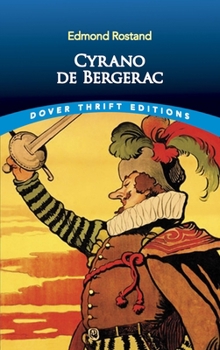Cyrano de Bergerac
Select Format
Select Condition 
Book Overview
This is Edmond Rostand's immortal play in which chivalry and wit, bravery and love are forever captured in the timeless spirit of romance. Set in Louis XIII's reign, it is the moving and exciting... This description may be from another edition of this product.
Customer Reviews
Sharon from Baltimore
Unexpected and enjoyable quick read
The only translation that captures the poetry of Rostand's original
A Fun and Approachable Classic
Translation captures poetry and wit of Rostand's hero.
Cyrano de Bergerac Mentions in Our Blog

Watching the Oscars this weekend? If so, you’ll want to catch up on the literature that served as inspiration for some of the nominated movies. Plus, we share some of our favorite book-to-screen best picture winners from the last quarter century.

Patricia Lockwood's ambitious new book aims to depict the experience of living "Extremely Online," while contrasting this ephemeral existence to that of "real life." Here we spotlight a handful of books that have taken on the themes of digital culture and its impact on life, relationships, and the very nature of humanity.






